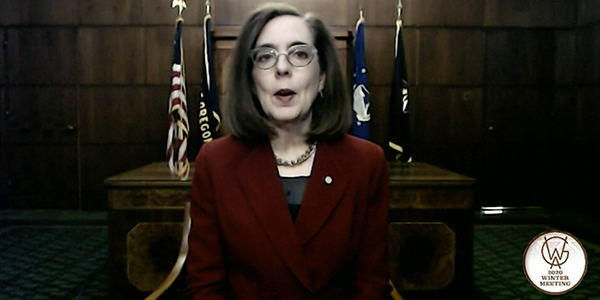Oregon Gov. Kate Brown (D) on Thursday set out a vision for building electric vehicle charging infrastructure across the West that was conspicuously light on environmental imperatives but heavy on economic ones.
In fact, Brown’s keynote speech at the virtual annual meeting of the Western Governors’ Association (WGA) made no mention of climate change, despite the fact that transportation electrification is a key factor in decarbonization strategies for states across the U.S., including Oregon, which is pursuing greenhouse gas reductions under Brown’s Executive Order 20-04. (See Oregon PUC Plans Take on Decarbonization.)
The omission may have been a concession to the spirit of bipartisanship touted by the WGA, an organization comprising governors from 22 states with widely divergent policies and perspectives on global warming.
As WGA’s current chair, Brown established the Electric Vehicles Roadmap Initiative as the signature effort of her one-year term, which began in July. In her speech, Brown said transportation electrification is “an issue that bolsters our current economies and creates a roadmap both literally and figuratively to the future.”
She noted that a number of Western states are working to encourage individuals and business to adopt EVs “because we recognize that a robust and efficient transportation sector is key to meeting economic goals and connecting businesses to regional and international markets.”
The governor also played to regional sympathies regarding energy independence.
“The use of electric vehicles also allows us to power our transportation system with energy produced right here in our Western states. As we all know, the wind in our plains, the sun in our deserts and the water in our rivers are less subject to the global geopolitical forces that influence oil markets,” she said.
Brown pointed to the “good news” of collaborative efforts already occurring across state — and international — lines, including the West Coast Electric Highway, an agreement among California, Oregon, Washington and British Columbia to build a network of fast-charging stations every 25 to 50 miles along Interstate 5 and U.S. Route 101 “to allow electric vehicles users to travel the length of the West Coast with the same certainty they would have if they were driving a gas vehicle.”
In a “shining example of bipartisan collaboration” farther inland, Brown said, Arizona, Colorado, Idaho, Montana, Nevada, New Mexico, Utah and Wyoming have joined up to create the Regional Electric Vehicle West Plan to foster EV travel in the Intermountain region.
“These efforts are born out of a mutual understanding that facilitating the use of electric vehicles isn’t a political imperative; it’s an economic one, making it easier for both consumers and businesses to travel and transport goods. Using electric vehicles frees up household incomes and yields increased profits,” Brown said.
The governor said she believes the region is “on the precipice of a historic transition” to be ushered in by coordinated planning and investment related to EV infrastructure.
“My chair’s initiative is working to coordinate technical aspects between existing subregional EV collaboratives and encourage participation from our Western states not yet engaged in EV network planning,” she said.
Brown’s goal: to reach an expanded regional agreement on EV charging by the next annual WGA meeting in a year.
“Fortunately, we are already well on our way,” Brown said. “We have held seven work sessions. We’ve brought together officials from the public sector with electric utilities, electric vehicle manufacturers and charging station manufacturers to chart a coordinated path forward to the expanded use of EVs. We’ve deliberated opportunities for states to support the growth of the consumer, medium-duty and heavy-duty EV sectors, [and] promote investment by utilities and their rate structures.”
Next year will see “the hard work of synthesizing the findings of these sessions” into a potential interstate agreement, Brown said. WGA will hold a series of public webinars to explore the expansion of EV use in the West.
Brown has asked her team to determine how to ensure the success of a potential agreement. “An agreement is only as successful as its implementation, and I’d like each party to be equally committed to the expansion of EV infrastructure across the entire West.”
“This work is emblematic of the spirit of the Western Governors’ Association, building on the successful efforts of individual states to create mutual benefit for all of us,” Brown said.




